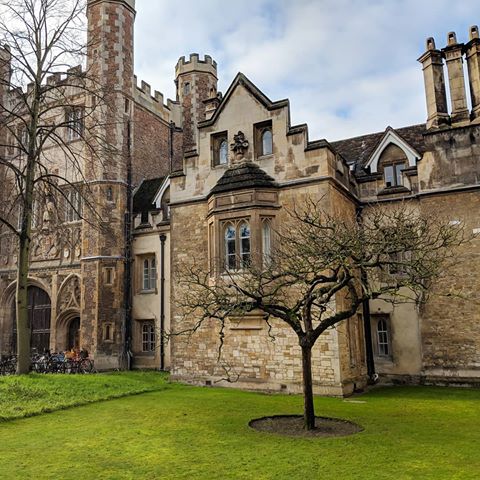I took a train to Cambridge for my interview at Trinity College today. This time I double checked beforehand that University of Cambridge was actually located in Cambridge, Cambridgeshire. The consequence of getting it wrong in the case of Warwick was severe. Although Warwick did give me an offer, it was an offer of 4 As. Given Cambridge and LSE only asked for 3 As in their offers, the extra one might be due to my inability to take a train. But given it was the only offer I got so far, maybe I should not complain too much.
When I arrived at Trinity, I was led to the college library where all the candidates waited. I was given a piece of paper with the questions that would get discussed during the interview and I had an hour to think about it beforehand. The question was a strange one. In fact it didn’t seem to have anything to do with economics at all: there was no demand, supply or the macro economy. Instead it talked about decisions people made in some seemingly identical situations and it asked at the end whether those decisions were rational.
The word “rational” was a new vocabulary to me. But that wouldn’t have mattered. The question was beyond anything I had learned in economics anyway. I therefore spent most of the hour admiring Trinity’ library. Everything inside there, from the shelves, desks, chairs to the books were so old that they gave out a wonderful smell. I quite enjoyed it and even had a short nap. It was just what I needed after the Burger King I had on the way.
Then it was the interview itself. It was said that almost all students struggled during their Oxbridge interviews. I was certainly one of them. The professor dived into that sheet of questions immediately. There were no softball ones such as why did you apply for Cambridge, Trinity or Economics at all. But maybe I should be grateful for that as I doubted my reasons would impress anyone.
I told the professor I never came across the word “rationality” before and asked him what it meant. To that, he laughed and replied, “I can not tell you. It is a question I am going to ask you later!”
Having no clue initially, I somehow recovered after a few hints from the professor. I even felt a light bulb came on over my head when I thought I finally understood the logic behind the questions. I then put together what I thought rationality meant and told the professor warily: “The people in the question are not rational, Sir. They are not.”
But the wire leading to the bulb quickly jumped after a couple more follow-up questions from the professor. They revealed some very weak points in my reasoning. Stupid me. I had to no choice but to change my stand, “They are actually rational, Sir, very rational.”
“Really? Have you thought about this and this then, are you sure they are rational?” the professor continued.
How did I not see that coming before changing my answer? I could not believe I got it right the first time but changed it. I was such an idiot. No wonder teachers always recommended sticking with the first guess. But before I managed to unfreeze my mind from the horror, the time was up. The professor had a look at his watch and declared the interview was over. That saved the embarrassment from me for changing the answer yet again. Doing it once was bad enough, twice would be a total disaster.

I came out of the college quite deflated. I sat down on the barrier surrounding the supposedly Newton’s Apple Tree to recover. My mind still on the rationality question. So were they rational or not? The more I thought about it, the more confused I became. And how could this be an economics question anyway?
Then I saw someone sitting next to me who was crying. From her very formal clothes, she must be here for interview as well. The only other group of people in town dressing like that were middle aged Asian tourists. She didn’t belong to either that age group or ethnicity.
So I tried to cheer her up a bit, “It is all right. Don’t worry. Mine was terrible as well. And I imagine Newton himself must not feel very good neither when he was hit on the head by an apple falling from that tree!”
Score: Me: 10, English: 23,185